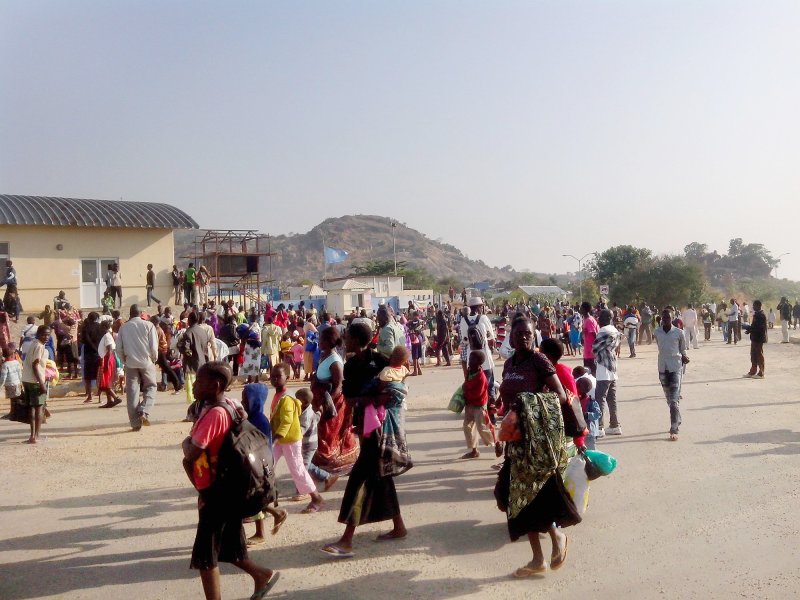Civilians seek protection after recent fighting in Juba, the capital of South Sudan on December 16, 2013. There were about 1200 civilians in the compound by the airport and 1000 in UN House at the time of these photos. UPI/UNMISS/George Mindruta
JUBA, South Sudan, Dec. 19 (UPI) -- Fighting between rival army units has spread to towns around the capital South Sudan's capital, with reports of 500 dead since Sunday, underlining the fragility of the world's youngest state and fears the violence will ignite a potentially disastrous tribal conflict.
The fighting is primarily between followers of President Salva Kiir Mayardit and his longtime main political rival, Riek Machar, whom he sacked as vice president in July and who is now on the run.
Juba was reported largely calm Wednesday, with some streets in ruins, as fighting broke out at military bases in nearby towns such as Bor, north of the capital, and Torit to the east. Some reports said Machar's forces were in control there.
The violence that erupted Sunday at two military bases in Juba between two wings of the Presidential Guard, manned by rival tribes, highlighted how the new state, despite the triumph of the Christian and animist south in gaining independence from the Arab Muslim north in July 2011, has inherited a legacy of deep ethnic divisions that could lead to a new conflict.
Kiir claimed Monday the violence was triggered by an attempted coup by Machar's forces.
But diplomats and officials of relief agencies suggested it was more likely Kiir had mounted a pre-emptive strike against Machar, his most acerbic critic who had announced his plans to run for president in elections set for 2015.
Diplomats who knew Kiir during his days as a guerrilla commander fighting the military might of the Khartoum regime say since the southern region achieved statehood through a peace deal that ended Sudan's devastating 1983-2005 civil war, Kiir has become "increasingly authoritarian."
Machar, a popular hero of the Sudanese people's Liberation Army headed by Kiir, has accused him of becoming a dictator as the fledgling southern state, one of the world's most impoverished countries despite its oil production, struggles to establish itself.
But underlying their enmity is the deep division between the south's two main ethnic tribal groupings, the Dinka, the largest, to which Kiir belongs, and the Nuer from which Machar comes.
Analysts say although events have focused on the dispute with Sudan to the north concerning the oilfields that lie mainly along the border and on the struggle to build state institutions, the central issue is the unresolved grievances between South Sudan's two main communities.
This is exemplified in the decades-old rivalry between Kiir and Machar within the SPLA and the Sudan People's Liberation Movement that's now the ruling party.
Kiir's peremptory dismissal of Machar as his vice president in July, along with his entire Cabinet, indicates suggestions Kiir has dictatorial leanings, if not ambitions, and that it was he, not Machar, who made the first military move Sunday, may have some validity.
"The fact that the fighting began because of paranoia and ethnic divisions in the Presidential Guard is a further sign of the deteriorating situation in the country where some of the smaller communities resent what they see as Dinka domination, or a 'Dinkocracy,'" analyst Daniel Howden said.
"The Presidential Guard, which until recently was hailed as a big step in integration, has come apart at the seams. Were similar grievances to come violently to the surface in the rest of the country, then mayhem would follow."
Analysts say that would plunge the landlocked south into an economic black hole. Although it sits on most of the region's oil, its only export route is through pipelines across Sudan.
Renewed conflict will block long-awaited exploration and could spill over into neighboring states like Kenya and Ethiopia, which are on the cusp of major energy booms.
The storm will likely engulf the north, which also has severe economic problems, including a growing budget deficit that has swollen since the south broke away in 2009, slashing Khartoum's revenues.
Sudan, largely desert, is heavily dependent on food imports, and spends about $800 million a month bringing in foodstuffs.
Eighty percent of its wheat is imported and prices have soared amid a sharp currency devaluation since separation.
In September, security forces killed about 200 people protesting fuel subsidy cuts. Unrest and political pressure on Khartoum is mounting.
Major dam-building on the Nile River in Ethiopia, where the mighty river rises, is likely to reduce the water supply and aggravate these tensions.





